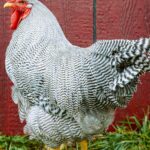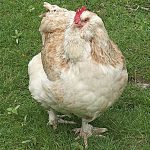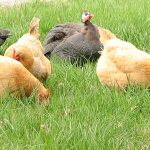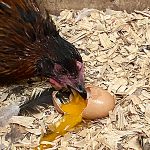
Rhode Island Red Chicken (Exhibition Type) Hatching Eggs
Continue Reading
Barred Plymouth Rock (Exhibition Type) – Sold as Baby Chicks Only
Minimums – Not Sexed = 3 Female = 3 Male = 1 Seasonal/Shipped Feb thru September Maximum of 5 Continue Reading
Precisely how long an egg takes to hatch depends on a lot of factors including species, breed, strain, conditions under which the egg was stored prior to incubation, and conditions during incubation. But whether you plan to hatch eggs in an incubator or under a hen you need a more definitive answer the question: How […]
Continue Reading
Chickens have no sweat glands, so chicken breeds that originated in hot climates have developed other features to help them stay cool. One is to grow a large comb and wattles, through which blood circulation increases in hot weather to help dissipate body heat. Another warm-climate adaptation is to avoid trapped heat by developing sparse […]
Continue Reading
In addition to the miniature versions of large warm weather chicken breeds, five other bantam breeds also do well when the temperature rises. Of those described below, four of the five bantam breeds that tolerate warm weather are true bantams. Bantam Chickens The history of bantam chickens follows that of the Industrial Revolution. As families […]
Continue Reading
Most chickens have four toes on each foot. Of the chicken breeds found in the United States, five breeds typically have five toes on each foot. The condition is technically known as polydactylism — from the Greek words poly meaning many, and daktylos meaning a finger or toe. The trait of having five toes represents […]
Continue Reading
If you would wonder what the word poultry means, you might think first to look in the American Poultry Association’s Standard of Perfection. At the front of the book is a glossary covering 8-pages of terms from “A.O.C.” to “yearling,” but no “poultry.” So, what is poultry? Definitions of Poultry Even though the Standard doesn’t […]
Continue Reading
Four traditional methods are used to tell male and female chicks apart. Which method is most appropriate for any specific batch of chicks depends on their breed and variety, their age, and the skill of the observer. Vent Sexing Vent sexing, also called cloacal sexing, is a method of determining a hatchling’s gender by examining […]
Continue Reading
Egg eating is a nasty habit that, left unchecked, can spread from one hen to many or even all the hens in the flock. Not only do you lose eggs, you also end up with messy egg residue in the nests. Here are 10 reasons hens eat their own eggs, and how to stop them. […]
Continue Reading
Starting a backyard flock with a small incubator and some hatching eggs can be fun and educational. How successful you are at hatching chicken eggs in an incubator will depend on a number of factors, some of which are out of your control — such as the inherent degree of difficulty in hatching eggs from […]
Continue Reading